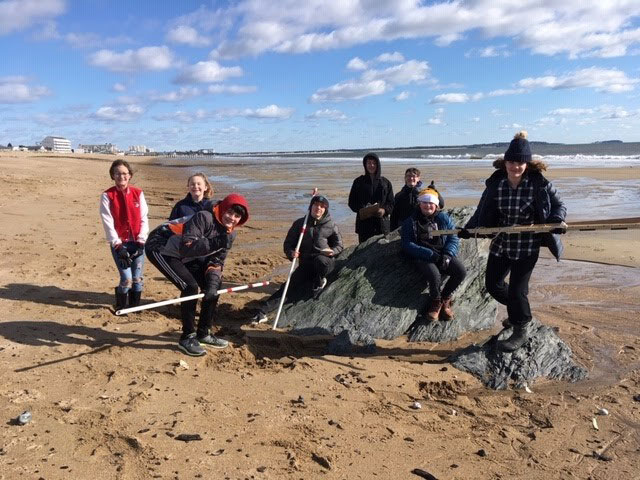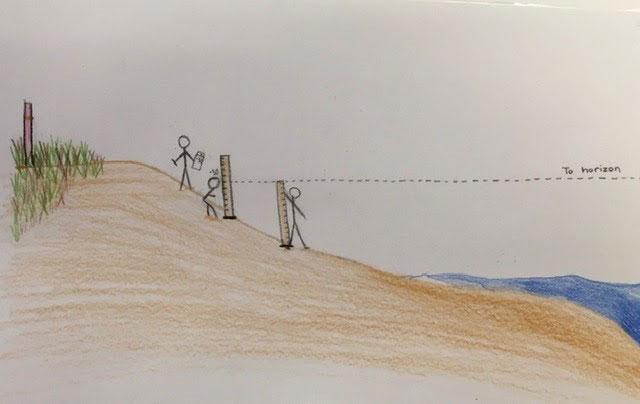The Natural Resources Council of Maine awarded grants to six Maine middle schools through our “Engaging Maine Middle School Students in Protecting the Nature of Maine” program, which we started in 2015. Each of the schools began their projects in early 2020, though due to the COVID-19 pandemic, schools, of course, have gone to online learning, so not all projects will be completed. Before schools were closed, we received photos and an update from Old Orchard Beach students and want to share it with you here. If schools are able to continue their projects online, we will share their progress with you later this spring.
Today, two of my seventh graders and I took an informal look ahead to our spring Piping Plover project, funded by NRCM. I asked students for their prior knowledge about Piping Plovers, and here is what they said:
“I’m super excited to learn more. I’ve seen them numerous times — feeding, running toward the waves, and scuttling back just in time.”
“I really like plovers and want them to stick around.”
“I’ve usually seen them up toward the dunes caring for chicks or just chilling.”
“I’ve seen them on the upper half of the beach close to the dunes. They were running around; I think they were adults.”
“I’ve never seen a nest, but I know that they make them in the dune area. It’s safer there, away from the waves, but there are other animals, predators, too. Gulls can take up their space and scare away plovers, and they might eat eggs or plover chicks.”
“It will be cool to observe them in their natural habitat.”
For this project, students in my gifted and talented program will work with members of the Old Orchard Beach Conservation Commission to monitor our town’s beaches during Piping Plover nesting season, and help engage the public in protecting the birds and their nests, or scrapes. Roger Stevens, a member of the commission and an experienced birder, works with Audubon staff to monitor and protect Piping Plover nests. He will be our mentor for this project. I am also a member of the commission, as well as a teacher at Loranger Memorial School, where I work with students from third through eighth grade.

Here are some students after beach profiling in February. It was COLD! We are looking forward to warmer weather for our Piping Plover project in the spring.
I am using our grant from NRCM to purchase seven pairs of quality binoculars for young birders. Mr. Stevens and I will teach students how to use the binoculars to identify and monitor birds from a distance and not disturb them. I will use the binoculars in other projects as well, to engage more students in learning to care for our natural environment and wildlife.
Later this spring, my students from grades 6-8 will learn about Piping Plovers, using Maine Audubon’s Piping Plover and Least Tern Recovery Project website and other resources. They will learn why the nests and chicks are vulnerable, why birds might abandon a nest site, and how people are trying to help. They will investigate data from our beaches and other beaches to find out how Piping Plovers are faring in Maine. In May, my small groups will make multiple trips to our beaches with Mr. Stevens to look for Piping Plovers, tracks, and nest sites. Students will collect data on each trip. Once they identify a nest site, we will notify Audubon to come and put up an ex-closure to protect it, if possible.
In recent years, Old Orchard Beach’s efforts to protect Piping Plovers have been successful. The Department of Public Works is committed to protecting Piping Plovers, and community members sign up with the DPW for shifts to monitor the nest sites. Volunteers hang out in the vicinity of the nests for several hours at a time, talking to beach-goers and dog walkers about protecting the vulnerable eggs and chicks. With more birds nesting on the beach, the Conservation Commission wants more volunteers to monitor the nests and the chicks. Families may volunteer, and students will help inform the community about the need for more volunteers. They will design their own projects to share information with the community. Ideas so far include flyers, public service announcements, designing a logo, and teaching younger students. Students will present their projects at the June meeting of the Conservation Commission.

This drawing by Maddy S, shows how we do beach profiling on West Grand Beach. Piping Plovers may nest in or near the dunes in April and May.
This project connects to other environmental science projects we do at Loranger, notably our beach profiling project. For seven years, our sixth graders have measured the beach’s profile each month. My students help other students learn how to profile, and they enter the data on mainecoastdata.org. Our profiles start in the dunes, and we always talk about why the dunes are important and why normally no one should walk there. Students know that one reason is to protect Piping Plovers, yet some of them have not seen these endangered birds. Now they will learn to identify and help protect them.
—by Mrs. Cynthia Nye with quotes and art from students
Banner photo: Piping Plover by David Small










Hi!
I live in OOB until 7/17. I was driving home and saw the sign for volunteers. I would like to volunteer if you still have a need!
Please contact me if I can help. I have my own binoculars. : )
Thank you!
Hello Elena,
We would encourage you to get in touch with the Old Orchard Beach Conservation Commission to see if they are in need of volunteers. NRCM isn’t working on this project directly though we did provide some funding for the Old Orchard Beach students’ project. You can find OOB Conservation Commission contact info here: https://www.oobmaine.com/conservation-commission. Thank you for your interest in protecting these birds!